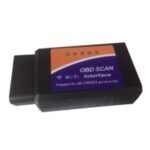Navigating the world of automotive diagnostics can be tricky, especially when it comes to older vehicles and their onboard diagnostic systems. If you’re an owner of a classic Toyota Land Cruiser FZJ80, specifically the 1997 model, you might be wondering about OBD2 compatibility and which scanners will actually work with your rig. Many FZJ80 owners have encountered confusion and frustration when trying to use modern OBD2 scanners, particularly the compact and affordable ELM327 Bluetooth adapters. This article dives into the specifics of Fzj80 Obd2 systems to help you choose the right diagnostic tool for your needs.
Understanding OBD2 and the FZJ80
The 1997 Toyota Land Cruiser FZJ80 falls into an interesting transitional period for automotive diagnostic standards. While it does feature an OBD2 port, the communication protocols and implementation are not always as straightforward as with later vehicles. OBD2, or On-Board Diagnostics II, is a standardized system that allows you to access vehicle data for diagnostics and monitoring. However, the “standard” has nuances, particularly in the early years of its adoption.
One key factor affecting OBD2 compatibility with the FZJ80 is the communication protocol. While many modern vehicles utilize CAN (Controller Area Network) protocols, the 1997 FZJ80 typically uses J1850 VPW (Variable Pulse Width Modulation). This older protocol is not universally supported by all OBD2 scanners, especially some of the budget-friendly mini ELM327 adapters flooding the market.
Mini ELM327 Adapters: Hit or Miss with the FZJ80
The original forum post highlights a common experience: many FZJ80 owners find that their mini ELM327 Bluetooth adapters, while working perfectly on newer vehicles, fail to connect or communicate properly with their Land Cruisers. Several users reported issues with pairing, data retrieval, and overall functionality when using these compact scanners on their ’97 FZJ80s.
The reason for this incompatibility often boils down to protocol support. As one forum member, TrickyT, pointed out, many of the very cheap mini ELM327 adapters, despite claiming J1850 VPW support, often lack the necessary circuitry to properly communicate using this protocol. Upon closer inspection, some users found that pin #2, crucial for J1850 VPW communication, wasn’t even connected to the circuit board in these budget adapters.
However, it’s not a universal failure. George_tlc reported success using a generic Bluetooth module with the Torque app on his 1997 FZJ80, indicating that some ELM327-based scanners can work. Toadshade also mentioned positive experiences with the same Mini Elm 327 setup on a ’95 model. This suggests that quality control and specific chipsets within ELM327 adapters can vary, leading to inconsistent results.
Exploring Alternative OBD2 Scanner Options for Your FZJ80
Given the mixed results with mini ELM327 adapters, what are reliable OBD2 scanner options for your 1997 Toyota Land Cruiser FZJ80? The forum thread provides valuable clues based on real-world user experiences:
-
Larger OBD2 Scanners: Several users, including 69vortec and JaketheSSnake, noted that larger, more robust OBD2 scanners, often not the “mini” variety, were successful in connecting to their FZJ80s when mini adapters failed. This suggests that these larger units may have better protocol support and more reliable hardware.
-
Wi-Fi OBD2 Scanners: Ridgerunner78 reported success using a Wi-Fi OBDII adapter with the DashCommand app on an iPhone. HardyDanger also recommended the Veepeak WiFi OBD2 scanner, confirming its compatibility with both a ’97 Land Cruiser and a newer Ford vehicle. Wi-Fi based scanners can sometimes offer more consistent connections and broader protocol support compared to basic Bluetooth adapters.
-
Specific Brands/Models: 98 SNAKE EATER highlighted using “Viecar” OBD2 adapters successfully on their ’97 TLC, showcasing a specific brand that has proven reliable for some FZJ80 owners. ChadHahn found that an Innova OBD2 reader worked correctly, further emphasizing that brand and model selection plays a significant role.
Pinout and Protocol Confirmation
Tremek provided crucial technical insight, pointing out that the OBD2 port on the 1997 FZJ80 uses a VPW pinout, specifically pins 2, 4, 5, and 16. ChadHahn confirmed this pin configuration on his vehicle. This reinforces the importance of J1850 VPW protocol support in any OBD2 scanner intended for a ’97 FZJ80.
Before purchasing an OBD2 scanner, especially a budget-friendly option, it’s wise to verify that it explicitly states support for J1850 VPW protocol. Reading user reviews, particularly from other FZJ80 owners, can also offer valuable real-world confirmation of compatibility.
Conclusion: Choosing Wisely for FZJ80 OBD2 Diagnostics
Diagnosing your 1997 Toyota Land Cruiser FZJ80 using OBD2 tools is absolutely possible, but requires some informed decision-making. While mini ELM327 Bluetooth adapters can be tempting due to their price and convenience, their compatibility with the FZJ80’s J1850 VPW protocol is not guaranteed and can be inconsistent.
For reliable OBD2 diagnostics on your FZJ80, consider these recommendations:
- Prioritize J1850 VPW Support: Ensure the scanner explicitly lists J1850 VPW as a supported protocol.
- Consider Wi-Fi or Larger Scanners: Wi-Fi OBD2 scanners and larger, more reputable brands often offer better protocol support and reliability.
- Check User Reviews: Look for reviews specifically mentioning FZJ80 or Toyota Land Cruiser compatibility.
- Test and Verify: If possible, purchase from a retailer with a good return policy, allowing you to test the scanner on your FZJ80 and return it if it doesn’t work.
By understanding the nuances of FZJ80 OBD2 systems and choosing your scanner carefully, you can effectively diagnose and maintain your classic Land Cruiser, keeping it running smoothly for years to come.
